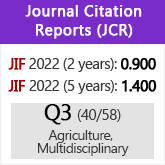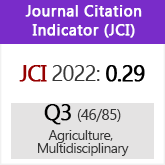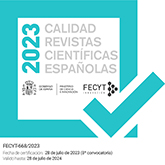Differential quality and technical/managerial advice relationships in Andalusian (Spain) olive oil protected designations of origin
Abstract
A relevant topic investigated in ‘Local Agro-Food Systems’ studies (LAFS) is the key role of collective action in the dissemination of innovations and knowledge aimed at the organization of quality on a local scale. The scope of this article deals with the methodological tools for typifying the relationships made, in LAFS hosting a Protected Designation of Origin (PDO), between the relational social capital and the differential quality of firms. The objective of this work is to categorize the agro-industrial firms into hierarchies for implementing rural development policies, with respect to their technical and managerial advice relationships and their score achieved in terms of product and process quality. The study takes into account the LAFS of “Estepa” and “Sierra de Segura”, Andalusia (S Spain), corresponding to two important olive oil PDOs. The methodological approach comprises, firstly, the elaboration of a quality synthetic indicator on processes and products of the mills. Secondly, social network analysis is applied to the technical/managerial advice networks of the mills. Thirdly, a mill typology was established by means of factor analysis which employs quality and relational indicators. It is proved that the Regulatory Boards, as well as the second-step cooperatives, can assume a role of integrating poles with respect to the collective action developed in the LAFS, particularly in terms of dissemination of knowledge and innovations, which enhances the process and product quality of local firms. The existence of networks is a necessary condition to improve and homogenize the quality in a diffuse local agro-food structure.Downloads
References
Allaire G, Sylvander B, 1997. Qualité spécifique et systèmes d'innovation territoriale. Cahiers d'Economie et Sociologie Rurales 44: 29–59.
Arriaza M, Nekhay O, 2009. Evaluación social multicriterio del territorio agrícola: el caso del olivar de baja producción. Rev Esp Est Agrosoc Pesq 226: 39-69.
Ashley C, Maxwell S, 2001. Rethinking rural development. Develop Policy Rev 19: 395-425. http://dx.doi.org/10.1111/1467-7679.00141
Barham E, Sylvander B (eds), 2011. Labels of origin for food. Local development, global recognition. CAB Int, Oxfordshire, UK. 218 pp.
Barjolle D, Sylvander B, 2000. Some factors of success for origin labelled products in agri-food suply chains in Europe: market, internal resources and institutions. In: The socio-economics of origin labelled products in agri-food suply chains: spatial, institutional and co-ordination aspects (Sylvander B, Barjolle D, Arfini F, eds.). EAAE Seminar, Le Mans (France), pp: 45-71.
Belletti G, Marescotti A, Paus M, Reviron S, Deppeler A, Stamm H, Thévenod-Mottet E, 2011. The effects of protecting geographical indications. Ways and means of their evaluation. Swiss Federal Institute of Intellectual Property, Bern, Switzerland. 122 pp.
Carmona-Torres C, Parra-López C, Hinojosa-Rodríguez A, Sayadi S, 2014. Farm-level multifunctionality associated with farming techniques in olive growing: An integrated approach. Agr Syst 127: 97-114. http://dx.doi.org/10.1016/j.agsy.2014.02.001
Casanueva-Rocha C, 2003. Relaciones estratégicas entre pymes: contraste de hipótesis empresariales mediante ARS. REDES 4(4): 1-27.
Casieri A, De Gennaro B, Medicamento U, 2008. Framework of economic institutions and governance of relationships inside a territorial supply chain: the case of organic oil in Sierra de Segura (Andalusia). Cahiers Agricultures 17(6): 537-541.
Chiffoleau Y, 2009. From politics to co-operation: the dynamics of embeddedness in alternative food supply chains. Sociologia Ruralis 49(3): 218-235. http://dx.doi.org/10.1111/j.1467-9523.2009.00491.x
Chiffoleau Y, Touzard JM, 2014. Understanding local agri-food systems through advice network analysis. Agr Hum Values 31: 19-32. http://dx.doi.org/10.1007/s10460-013-9446-6
Crespo J, Réquier-Desjardins D, Vicente J, 2014. Why can collective action fail in local agri-food systems? A social network analysis of cheese producers in Aculco, Mexico. Food Policy 46: 165-177. http://dx.doi.org/10.1016/j.foodpol.2014.03.011
Fleskens L, Duarte F, Eicher I, 2009. A conceptual framework for the assessment of multiple functions of agro-ecosystems: A case study of Trás-os-Montes olive groves. J Rural Stud 25: 141-155. http://dx.doi.org/10.1016/j.jrurstud.2008.08.003
Garcia-Macias A, 2002. Redes sociales y "clusters" empresariales. REDES 1(6): 1-20.
Garcia-Valdecasas J, 2011. Una definición estructural de capital social. REDES 20(6): 132-160.
Giuliani E, 2007. The selective nature of knowledge networks in clusters: evidence from the wine industry. J Econ Geograph 7: 139–168. http://dx.doi.org/10.1093/jeg/lbl014
Giuliani E, Bell M, 2005. The micro-determinants of meso-level learning and innovation: evidence from a Chilean wine cluster. Research Policy 34: 47–68. http://dx.doi.org/10.1016/j.respol.2004.10.008
Jimenez-Herrera B, Carpio-Due-as A, 2008. La cata de aceites. Aceite de oliva virgen. Características organolépticas y análisis sensorial. Junta de Andalucía, Sevilla, Espa-a. 134 pp.
Koo Y, Parck SO, 2012. Structural and spatial characteristics of personal actor networks: The case of industries for the elderly in Korea. Papers in Regional Science 91(1): 43-65. http://dx.doi.org/10.1111/j.1435-5957.2011.00370.x
Lin N, 1999. Building a network theory of social capital. Connections 22(1): 28-51.
MAGRAMA, 2013. Datos de las denominaciones de origen protegidas y de las indicaciones geográficas protegidas de productos agroalimentarios 2012. Ministerio de Agricultura, Alimentación y Medio Ambiente, Madrid, Spain.
Mateos M, Cendon ML, Viteri ML, 2006. Redes locales de innovación en el sistema agroalimentario. El caso de Mar del Plata y Balcarce. In: Estrategia y dinámica de la innovación en la industria alimentaria argentina (Ghezán G, Acu-a A, Mateos M, eds.). Astralib Cooperativa Editora, Buenos Aires (Argentina), pp: 301-317.
Molina J, Avila J (eds.), 2011. Antropología y redes sociales. Una introducción a Ucinet-6-Netdraw, Egonet y el análisis comparado con SPSS. Universidad Nacional Federico Villareal, Perú. 111 pp.
Muchnik J, Sanz-Ca-ada J, Torres-Salcido G, 2008. Systèmes agroalimentaires localisés: état de recherches et perspectives. Cahiers Agricultures 17(6): 513-531.
Requier-Desjardins D, 2012. The LAS approach: a scheme for a sustainable local development of Latin American rural areas? In: Local agri-food systems in a global world (Arfini F, Mancini MC, Donati M, eds.). Cambridge Scholars Publ., UK, pp: 153-171.
Rocamora-Montiel B, Colombo S, Sayadi S, Estévez C, 2013. Los impactos del olivar ecológico de monta-a frente al convencional post-condicionalidad: una visión de los expertos. Rev Esp Est Agrosoc Pesq 234: 49-82.
Sanz-Ca-ada J, 2007. Calidad y signos distintivos. Las denominaciones de origen de aceite de oliva en Espa-a. In: El futuro del mundo rural (Sanz-Ca-ada J, ed.). Ed. Síntesis, Madrid (Spain), pp: 175-198.
Sanz-Ca-ada J, Macías-Vázquez A, 2005. Quality certification, institutions and innovation in local agro-food systems: Protected designations of origin of olive oil in Spain. J Rural Stud 21: 475–486. http://dx.doi.org/10.1016/j.jrurstud.2005.10.001
Sanz-Ca-ada J, Hervas-Fernández I, Sánchez-Escobar F, Coq-Huelva D, 2012. Investigación e innovación en el sector del aceite de oliva en Espa-a. Informe de la Plataforma Tecnológica del Oliva (ALENTA), Ministerio de Ciencia e Innovación y FEDER, Madrid, Spain. 312 pp.
Semitiel-Garcia M, Noguera-Mendez P, 2004. Los sistemas productivos regionales desde la perspectiva del análisis de redes. REDES 6(3): 1-26.
Sylvander B, 2004. Development of origin labelled products: humanity, innovation and sustainability. INRA-UREQUA. Le Mans, France. WP7 Final Report Synthesis and Recommendations Concerted Action DOLPHINS.
Tregear A, Arfini F, Belletti G, Marescotti A, 2007. Regional foods and rural development: The role of product qualification. J Rural Stud 23: 12–22. http://dx.doi.org/10.1016/j.jrurstud.2006.09.010
Uceda M, Hermoso M, Aguilera MP, 2008. La calidad del aceite de oliva. In: El cultivo del olivo (Barranco D, Fernández-Escobar R, Rallo L, eds.). Eds. Mundi-Prensa and Junta de Andalucía, 6ª Ed., Madrid (Spain), pp: 699-727.
Vakoufaris H, 2010. The impact of Ladotyri Mytilinis PDO cheese on the rural development of Lesvos island, Greece. Local Environ 15(1): 27-41. http://dx.doi.org/10.1080/13549830903406057
Wasserman S, Faust K, 1994. Social network analysis. Methods and applications. Cambridge Univ. Press, UK. 825 pp. http://dx.doi.org/10.1017/CBO9780511815478
Woolcock M, Narayan D, 2000. Social capital: implications for development theory, research, and policy. The World Bank Research Observer 15: 225-249. http://dx.doi.org/10.1093/wbro/15.2.225
© CSIC. Manuscripts published in both the printed and online versions of this Journal are the property of Consejo Superior de Investigaciones Científicas, and quoting this source is a requirement for any partial or full reproduction.
All contents of this electronic edition, except where otherwise noted, are distributed under a “Creative Commons Attribution 4.0 International” (CC BY 4.0) License. You may read here the basic information and the legal text of the license. The indication of the CC BY 4.0 License must be expressly stated in this way when necessary.
Self-archiving in repositories, personal webpages or similar, of any version other than the published by the Editor, is not allowed.















